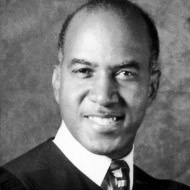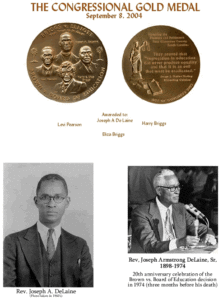Hall v. DeCuir and Brown v. Board of Education
 Judge Willie E.B. Blackmon was personally recruited by then-university president Gen. James Earl Rudder to receive one of the first athletic scholarships for African-Americans in the history of Texas A&M. A graduate of Phillis Wheatley High School in Houston, Blackmon was a member of the 1970 Southwest Conference (SWC) Championship Track and Field Team, a three-time All-SWC athlete and an All-American in the 880-yard dash. Blackmon received his J.D. from Thurgood Marshall School of Law in 1982 and entered the U.S. Air Force in 1984 where he served as a military attorney. Judge Blackmon retired from the Houston Municipal Courts in 2004 and the U.S. Armed Forces in 2009. In 1994, he was inducted into the Texas A&M Athletic Hall of Fame and was named a Texas A&M Distinguished Alumnus in 2005.
Judge Willie E.B. Blackmon was personally recruited by then-university president Gen. James Earl Rudder to receive one of the first athletic scholarships for African-Americans in the history of Texas A&M. A graduate of Phillis Wheatley High School in Houston, Blackmon was a member of the 1970 Southwest Conference (SWC) Championship Track and Field Team, a three-time All-SWC athlete and an All-American in the 880-yard dash. Blackmon received his J.D. from Thurgood Marshall School of Law in 1982 and entered the U.S. Air Force in 1984 where he served as a military attorney. Judge Blackmon retired from the Houston Municipal Courts in 2004 and the U.S. Armed Forces in 2009. In 1994, he was inducted into the Texas A&M Athletic Hall of Fame and was named a Texas A&M Distinguished Alumnus in 2005.
I am a proud descendant of the DeCuir family of Louisiana that played a prominent role in Civil Rights history.
My grandmother, evangelist Annette (DeCuir) DeQuair, was born near Franklin, Louisiana. Her father Rev. Richard (DeCuir) DeQuair was born a slave in New Iberia, Louisiana. He was illiterate and misspelled his last name because of its phonetic sound interpretation. After leaving the plantation with his mother, a former slave, he took on the last name of his white biological father, Albert DeCuir, a lumber mill entrepreneur and Confederate Officer. Albert was the oldest child of Mr. and Mrs. Ferjus DeCuir, who were the owners of the Ferjus DeCuir Plantation.
In the 1870’s, Mrs. Josephine DeCuir, a relative of evangelist Annette DeQuair, boarded a steamship in New Orleans after purchasing transportation passage to Hermitage, near present day New Roads, La. At the time, Louisiana had an integrated policy regarding public transportation. However, the steamship Captain advised Madame DeCuir she could not sit with Whites and removed her to what this Mississippi-based steamboat Captain said was the colored section. Madame DeCuir protested and later filed a Civil Rights lawsuit in New Orleans. She lost in the District Court of New Orleans, but won at the Supreme Court of Louisiana.
Later, following the death of the riverboat Captain, his estate appealed this decision to the Supreme Court of the United States.
The U.S. Supreme Court reversed the Louisiana Supreme Court decision stating that the case was not a Civil Rights violation, but instead fell under the law of Interstate Commerce in that the steamship had to cross over the Mississippi River at Natchez, Mississippi that honored the law of separation of blacks and whites along the interstate commercial passenger travel routes. This was a 5-4 decision in which most of the Southern Justices voted nay. The case is still cited as an important benchmark in Louisiana and American Civil Rights history. When deciding the case of Plessy v. Ferguson, a New Orleans case involving a black shoemaker, the language of Hall v. DeCuir was used to arrive at the “separate but equal” doctrine.
Years later in Brown v. Board of Education Topeka (Kansas) the language of Hall v. DeCuir and Plessy v. Ferguson was used to integrate educational institutions and transportation facilities and strike down “separate but equal.” The first of the five cases that comprised Brown v. Board of Education was filed in Summerton, South Carolina, and cited as Gregg v. Elliott. My grandmother Berniece Belton’s family, which originated in South Carolina, was instrumental in pushing forward Gregg v. Elliott as our relative Rev. J.A DeLaine, who also served as a school principal, fought to protect the rights of his students. Thurgood Marshall represented the movant’s in this case. The reason it did not become the lead case in this historic lawsuit which struck down the “separate but equal” doctrine, was that it was a Southern case. A Texas Justice decided that the case would have a better chance of succeeding if the Midwestern lawsuit of Brown v. Board was used as the lead case.
 Rev. J.A. DeLaine’s son, J.A. DeLaine, Jr., a member of the Belton family, posthumously received a Congressional Gold Medal in 2004, for the important role his father played in Gregg v. Elliott. His older brother, Brumit B. DeLaine, while a student at Johnson C. Smith College in 1960, organized and led sit-ins at Charlotte’s segregated uptown lunch counters. Congressman James E. Clyburn (D-SC) co-sponsored successful legislation to award Rev. DeLaine and other civil rights heroes in the South Carolina fight for integration and the right to receive these distinctive honors.
Rev. J.A. DeLaine’s son, J.A. DeLaine, Jr., a member of the Belton family, posthumously received a Congressional Gold Medal in 2004, for the important role his father played in Gregg v. Elliott. His older brother, Brumit B. DeLaine, while a student at Johnson C. Smith College in 1960, organized and led sit-ins at Charlotte’s segregated uptown lunch counters. Congressman James E. Clyburn (D-SC) co-sponsored successful legislation to award Rev. DeLaine and other civil rights heroes in the South Carolina fight for integration and the right to receive these distinctive honors.
When he gave the welcome and introduction at a moving Capitol Rotunda Ceremony awarding the medals, he said “Because of the courage and undying perseverance of these recipients the words all men are created equal finally ring true. Their actions changed the climate of the country so that Rosa Parks could keep her seat, the Freedom Riders could ride, and Martin Luther King, Jr. could march.”
I am honored my distant cousins Madam Josephine DeCuir and Rev. J.A. DeLaine stood up against clear violations of civil rights, and played an important role in the American civil rights movement of the 1950’s and 60’s.
REFERENCES:
1. Albert DeCuir Arrives in Louisiana, The Story of the DeCuir Family from Hainaut Who Came to America, Published by Randy DeCuir and Associates, pg. X, Copyright 1995.
2. New Iberia, Essays on the Town and Its People, by Glenn R. Conrad, Second Ed., Center for Louisiana Studies, University Of Southwestern Louisiana at Lafayette, Louisiana, pgs. 28-29.
3. Southwest Louisiana Biographical and Historical, Published by The Gulf Publishing Company, 1901, Reprinted Claiton Publishing Div. of Baton Rouge, 1971.
4. Landmarks in Civil Rights History. The Unfinished Agenda of Brown vs, Board of Education, Educators of Black Issues in Higher Education, pgs. 4-4 and 15-16, Published by John Wiley & Sons, Inc,, Hoboken, New Jersey, Pgs. 3-4, 15-16, and 7, Copyright 2002.
5. B.B. DeLaine: Quiet Crusader Whose Family Changed History Dies at 74, by David Perlmutt, Charlotte Observer, June 15, 2012.
6. South Carolina Desegregation Heroes Receive Congressional Gold Medals, Congressional Press Release of Congressman James E. Clyburn Representing the 6th District of South Carolina, September 8, 2004.
Click edit button to change this text.
